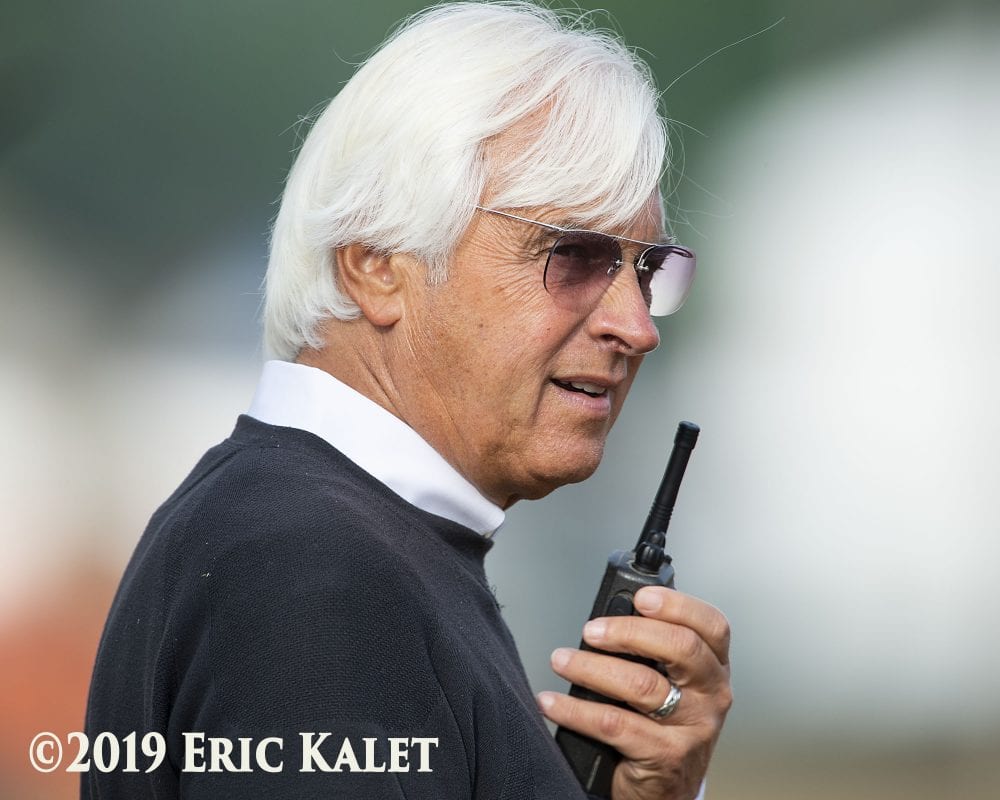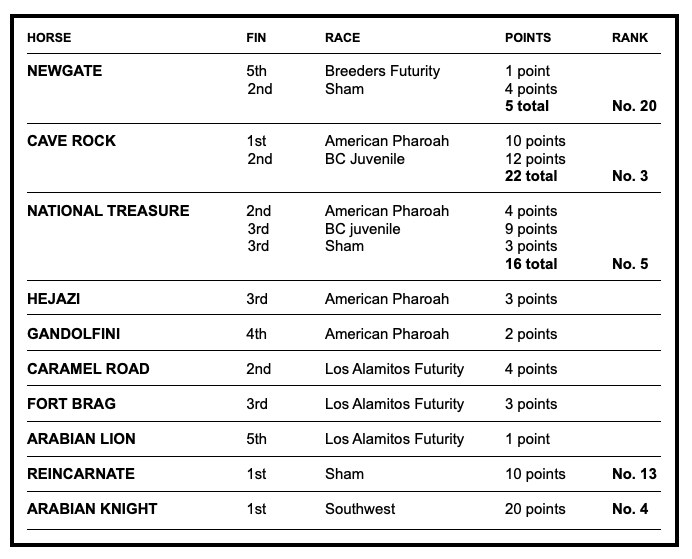
Bob Baffert (Photo by Eric Kalet)
By Laura Pugh
When it comes to horse racing rules and regulations it seems the playing field is not even. Not even in the same jurisdiction.
Until HISA’s Anti-Doping and Medication Control (ADMC) goes into effect tentatively in March each jurisdiction is still under its own control. And it seems each case is treated differently with different timetables and different punitive actions for similar violations.
And what about ongoing violations with appeals? What about pending races until HISA’s ADMC goes into effect? What about all of the delays, confusion, and inequity?
When is enough, enough?
Churchill Downs Inc. (CDI) owns the Kentucky Derby race and all of its trimmings. With that comes a lot of weight, weight that should be carried with the grace and elegance that befits a historic event.
When the Covid-19 situation arose putting most of racing on hold and the Triple Crown schedule up in the air, CDI did not consult with the other two Triple Crown tracks, Pimlico Race Course and Belmont Park, as to the schedule of the other two legs of the Spring Classic series. CDI arbitrarily scheduled the Kentucky Derby and pretty much said work around us.
CDI arbitrarily decides which races are part of the Road to the Kentucky Derby and may award qualifying points. A race on the Road has a higher profile with the public and the grading committee.
In September of 2022, Churchill Downs announced that there were slight modifications made to the Road to the Kentucky Derby series. Points will now be awarded to the top-five finishing positions in qualifying races, and the significance of the TVG Breeders’ Cup Juvenile (G1) and select races traditionally run in late January was increased.
The elevated 2023 prep season races, which are all Grade 3’s, are the Lecomte Stakes at the Fair Grounds, Southwest Stakes at Oaklawn, the Withers at Aqueduct, the Holy Bull at Gulfstream Park, the Robert B. Lewis at Santa Anita, the Sam F. Davis at Tampa Bay Downs and the John Battaglia Memorial at Turfway Park.
“We believe these modifications adhere to and amplify our goal of assembling the finest group of 3-year-olds in the starting gate for a race at the classic distance of 1 1/4 miles on the first Saturday in May,” said Mike Ziegler, vice president and general manager at Churchill Downs.
But just as they can elevate a race to prep status, they can demote a race. Take the Grade 3 Illinois Derby first run at Hawthorne in 1923.
Prior to 2000, the race was run between the Kentucky Derby and the Preakness Stakes thus competing with the second leg of the Triple Crown for good runners. Beginning in 2001, the Illinois Derby was moved to four weeks before the Kentucky Derby and instantly became a major Triple Crown prep race.
Considered an important Kentucky Derby prep, the Illinois Derby produced Kentucky Derby and Preakness winner War Emblem, Kentucky Derby favorite and Preakness runner-up Sweethnorthernsaint, and Kentucky Derby/Preakness third-place finisher Musket Man.
When the race moved back to Hawthorne from Sportsman’s Park in 2002, while still a Grade 2, Churchill Downs revoked its Derby prep race status, and the Illinois Derby went to the minor leagues.
Since Churchill began the Derby points system in 2013, the Illinois Derby has only been run three times, the last edition being in 2017.
Would being a Derby prep race have saved the Illinois Derby? Is there bias on the Road?
When are rules, rules for everyone?
On February 21, 2022, the Kentucky Horse Racing Commission (KHRC) disqualified Medina Spirit from his first-place finish in the 2019 Kentucky Derby and suspended trainer Bob Baffert for 90 days. The KHRC ruling was based on two positives test results for the drug, betamethasone. After his last appeal was denied, Baffert served his 90-day suspension that began on April 4, 2022.
Soon after the KHRC ruling, acting as a private property owner, Churchill Downs Inc. barred Baffert from competing at its tracks through the middle of 2023.
This prohibits Baffert from competing in the Kentucky Derby for 2 years. His runners are unable to earn any Kentucky Derby points. The two-year Kentucky Derby ban was a CDI house rules ban, and not issued by or associated with the KHRC. Baffert and his legal team are, as recently as this week fighting the Kentucky Derby ban and the KHRC ruing, two separate issues despite the KHRC suspension already being served, and being banned from the Derby last year.
KHRC has had issues with other trainers in big and small races but has yet to put in far-reaching punishments against any others than Baffert.
The Asmussen case dates back to 2018, when two of his trainees showed post-race positives for metabolites of the sedative Acepromazine: Thousand Percent after winning the second race at Churchill Downs on June 28, 2018; and Boldor after winning the sixth race at Keeneland on Oct. 25, 2018.
In late 2019, following a formal hearing before the stewards, the KHRC issued Asmussen a 30-day suspension and a $3,500 fine. An additional 30 days were stayed due to mitigating circumstances (number of violations due to overall record), pending no further violations for 365 days. Asmussen subsequently appealed.
A hearing on that appeal was conducted in August last year by hearing officer Jim Howard, who left the Public Protection Cabinet before making a recommendation. Hearing officer Eden Davis Stephens succeeded Howard and based on the existing record she recommended a 30-day suspension for Asmussen in October of 2022.
KHRC decision to approve the hearing officer’s recommendation did not come with a set date for Asmussen to serve the 30 days; the KHRC order did note that the action could be appealed in civil court.
Trainer Brad Cox was suspended for 10 days and fined $1500 by the Churchill Downs stewards for a phenylbutazone overage detected in the runner-up of the 2021 G2 Stephen Foster S, Warrior’s Charge.
According to a ruling dated May 15, 2022, and posted to the Kentucky Horse Racing Commission (KHRC) website, the Class C positive was present in the post-race testing of MGSW Warrior’s Charge at a level of 2.51 micrograms per milliliter of blood.
Phenylbutazone, also called Bute, is a non-steroidal anti-inflammatory drug. Kentucky’s racing rules permit it on race day in concentrations at or less than three-tenths (0.3) micrograms per milliliter.
Cox’s suspension ran from May 23 to June 1, 2022. Warrior’s Charge was disqualified, and the purse money was redistributed.
One would think the two-year house rules “Baffert ban” would be enough. Apparently not. Now The Triple Crown nominations rules have what is essentially a Bob Baffert clause. The following is new language instituted this year in the Triple Crown nominations terms and conditions:
“For purposes of this preference, the Road to the Kentucky Derby Point System shall mean the point values assigned to the first four finishing positions in each race comprising the Road to the Kentucky Derby as published by CDRT. Points in Road to the Kentucky Derby races will only be awarded to horses who: 1) compete without administration of Furosemide (Lasix) within 24 hours of the Road to the Kentucky Derby race; and 2) are not trained by any individual who is suspended from racing in the 2023 Kentucky Derby, or any trainer directly or indirectly employed, supervised, or advised by a suspended trainer (“suspended trainer or affiliates”). Should a horse trained by a suspended trainer or affiliates finish in a position that would have earned points in a Road to the Kentucky Derby race, the points associated with that finish will be vacated. Horses under the care of any suspended trainer or affiliates may be transferred to a non-suspended trainer and become eligible for earning points on a forward-looking basis so long as the transfer is complete by February 28, 2023.”
New language added to Triple Crown nominations
Last year, the first year of the 2-year Kentucky Derby ban, horses from the Bob Baffert barn were allowed to transfer to a new barn as late as early April. If they were transferred by that point, they were afforded the opportunity to earn points in any subsequent preps.
That will not be the case this year. Because of this new rule, horses must be transferred by February 28th. It reads as though the only purpose of this new language is to prevent the type of late transfers we saw last year. The new rule, only seems applicable to the Kentucky Derby, seeing as horses trained by Baffert are still eligible to be nominated to The Preakness and Belmont Stakes as individual races. So, while this is a stipulation for “Triple Crown” nominations, it seems to only be applicable to the Kentucky Derby.
Although, last year The Maryland Jockey Club did bar Baffert from participating in the Preakness and NYRA followed suit prohibiting the Hall of Fame trainer from starting any horses in the Belmont Stakes.
In fact, NYRA tried to take it a step further and bar Baffert from all NYRA facilities.
NYRA is claiming that Baffert’s alleged conduct is or has been “detrimental” to three entities: 1) The best interests of racing; 2) The health and safety of horses and jockeys; 3) NYRA’s business operations.
NYRA had tried to rule off Baffert back on May 17, 2021, without any sort of due process. But he filed a federal lawsuit that got that ban overturned, and now must go through a newly invented NYRA exclusionary hearing process, at which Medina Spirit’s still-not-adjudicated GI Kentucky Derby drug positive and four other recent equine drug infractions are the focal points.
Excerpts from the hearing testimony of former NYSGC steward Stephen Lewandowski as reported by Thoroughbred Daily News Jan. 27, 2022:
Under pressure of cross-examination by NYRA’s lead attorney Hank Greenberg, that questioned his credibility, a retired New York State Gaming Commission (NYSGC) steward launched into a nearly five-minute tirade just before the close of Wednesday’s hearing to determine whether the New York Racing Association (NYRA) can exclude trainer Bob Baffert over alleged “detrimental conduct.”
Lewandowski, called as a witness by Clark Brewster, one of Baffert’s attorneys, testified that he had never met the Hall of Fame trainer in person until Tuesday. The former steward said he had reached out to Baffert by phone “when this whole [NYRA banishment] process started up, and I offered my support because I feel he’s being unfairly taken advantage of.”
“… They just decide to suspend Bob Baffert and not even speak to him. You think that’s right? You’re an attorney. Do you?” Lewandowski challenged Greenberg.
“Do you think if I conduct an investigation about you and not [ask you] what the circumstances are that that’s right? That’s what you’re doing with Bob Baffert. You’re suspending him without even speaking to him. How about asking him about charges in Kentucky that haven’t even been filed yet? If I was him, I wouldn’t answer the question!” Lewandowski snarled.
“[Baffert is] testifying in two hearings now. How could you do that to somebody?…”
…Brewster came back up to address a final point related to Baffert being allegedly unfairly targeted by NYRA. It was a quietly emphatic one that might have been worth having his witness’s credibility picked apart.
“All these things [Greenberg] said that were so bad about this trainer, Rick Dutrow. Did NYRA seek to suspend Rick Dutrow?” Brewster asked.
“No,” Lewandowski replied.
“In your career, did you ever see NYRA take after a trainer such as [with Baffert], that never had a violation in New York?” Brewster asked.
“No,” Lewandowski replied, having regained his composure.
Then the California Horse Racing Board (CHRB) kicked Baffert out of his California barns at his two home tracks—Santa Anita and Los Alamitos. Baffert’s appeal for a stay of his suspension had just been denied by the Kentucky Court of Appeals on April 1 and he was now banned from all enclosures under the jurisdiction of the CHRB during the Kentucky suspension.
According to CHRB rules, even though Baffert was suspended by another state, the CHRB rule was in effect for any suspension of more than 60 days.
He was also not permitted to be involved in the training of horses previously under his care.
“Because of the CHRB’s ruling, any trainer on the grounds at Santa Anita Park, Golden Gate Fields, San Luis Rey Downs or Los Alamitos Race Course who may be the transferee of horses from the Baffert barn will be required to apply for stalls for those horses from the Santa Anita or Golden Gate Fields racing offices, as applicable, for review and approval,” according to a statement issued Saturday by 1/ST Racing, an arm of The Stronach Group, which owns Santa Anita.
“A Change of Trainer form will also be required to be submitted in order to enter races following such transfer. Horses that are not transferred to a trainer in California will be required to leave the grounds prior to April 4.”
Baffert was made to vacate his barn at Santa Anita Park, horses, tack and signage, prior to the start of the suspension on April 4th.
No violation in New York, no violation in California. Again, when is enough, enough?
A Road Without A Map
Bob Baffert has a loaded list of three-year-olds that are Kentucky Derby prospects.
The conditioner has 10 horses who have competed in Derby prep races and have had to forfeit points. Three would have earned enough points to be in the top 10 on the Derby Leaderboard. Collectively his horses have earned 86 qualifying points. Arabian Knight, who impressively took the Southwest Stakes, in only his second start, would have earned 20 points, but due to the ban currently sits at zero.

It’s not just Baffert who suffers. His owners take a huge hit because they are also banned. Of course, they could transfer their horses to another trainer. But that doesn’t resolve any of these issues. Further, as an investor in the game, a stake holder, who we need more of, should you not A) be free to chose the trainer you want, and B) expect that trainer to be treated as all others in all jurisdictions?
Nationwide there should be clear and concise rules for allowable and non-allowable medications, and UNIFORM responses to violations of the same class and nature. HISA, or someone, needs to step up and make this finally happen.





